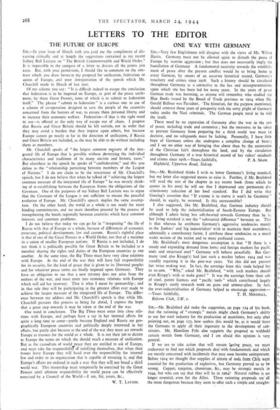THE FUTURE OF EUROPE
LETTERS TO THE EDITOR
SIR,—In your issue of March loth you paid me the compliment of dis- cussing critically and at length the suggestions contained in my recent Sidney Ball Lecture on " The British Commonwealth and World Order." It is impossible in the compass of a letter to discuss all the points you raise. But, with your permission, I should like to comment on the con- trast which you draw between rhy proposal for unification, federation or union of Europe, and your interpretation of the speech which Mr. Churchill made in March of last year.
Of my scheme you say: " It is difficult indeed to escape the conclusion that federation is to be imposed on Europe, as part of the peace settle- ment, by three Great Powers, none of which is to submit to federation itself." The phrase " submit to federation " is a curious one to use of a scheme of co-operation designed to save the people of the countries concerned from the horrors of war, to ensure them personal liberty and to increase their economic welfare. Federation—if that is the right word to use—is offered as the only way of escape out of chaos. I propose that Russia and Great Britain should be left outside, not in order that they may avoid a burden that they impose upon others, but because Europe cannot go nearly as far in the direction of unification, if Russia and Great Britain are included, as she may be able to do without including them as members.
Mr. Churchill speaks of " the largest common measure of the inte- grated life of Europe that is possible without destroying the individual characteristics and traditions of its many ancient and historic races." But elsewhere in the speech he speaks of " confederation," and this you define as the " relationship pertaining between members of the League of Nations." I do not claim to be the interpreter of Mr. Churchill's speech, but I do not believe that when he talked of " achieving the largest common measure of the integrated life of Europe " he was merely think- ing of re-establishing between the European States the obligations of the Covenant. One of the purposes of my Sidney Ball Lecture was to argue that the Covenant of the League is not sufficient to ensure the peaceful evolution of Europe. Mr. Churchill's speech implies the same assump- tion. On the other hand, the world as a whole is not ready for more binding commitments, and we must therefore proceed by the process of strengthening the bonds regionally between countries which have common interests and common problems.
I do not believe that today we can go far in " integrating " the life of Russia with that of Europe as a whole, because of differences of economic structure, political development, law and custom. Russia's rightful place is that of one of the Great Powers in a World Order, not that of a member in a union of smaller European nations. If Russia is not included, I do not think it is politically possible for Great Britain to be included as a member sharing the rights and duties of the European countries to one another. At the same time, the Big Three must have very close relations with Europe. At the end of the war they will have full responsibility for its security, for the kind of peace that is given to its liberated peoples and for whatever peace terms are finally imposed upon Germany. They have an obligation to see that a new tyranny does not arise from the embers of the war, and must enter into economic relations with Europe which will aid her recovery. That is what I mean by sponsorship ; and in that role they will be participating in the greatest effort ever made to achieve the largest measure of the integrated life of Europe. The differ- ence between my address and Mr. Churchill's speech is that while Mr. Churchill pictures this process as being far ahead, I express the hope that a great step towards it may be taken at the end of the war.
One word in conclusion. The Big Three must enter into close rela-
tions with Europe, and perhaps have a say in her internal affairs for quite a long time to come—partly because England and Russia are geo- graphically European countries and politically deeply interested in her affairs, but partly also because at the end of the war they must act towards Europe as trustees for the world as a whole. It is not their job to dictate to Europe the terms on which she should reach a measure of unification. But as the custodians of world peace they are entitled to ask of Europe, and must take the responsibility of satisfying themselves, that when their troops leave Europe they will hand over the responsibility for internal law and order to an organisation that is capable of ensuring it, and that Europe's affairs are ordered in such a way that they will not breed a third world war. This trusteeship must temporarily be exercised by the Great Powers until ultimate responsibility for world peace can be effectively exercised by a Council of the World.—I am, Sir, yours, &c.,
W. T. LAYTON.


























 Previous page
Previous page